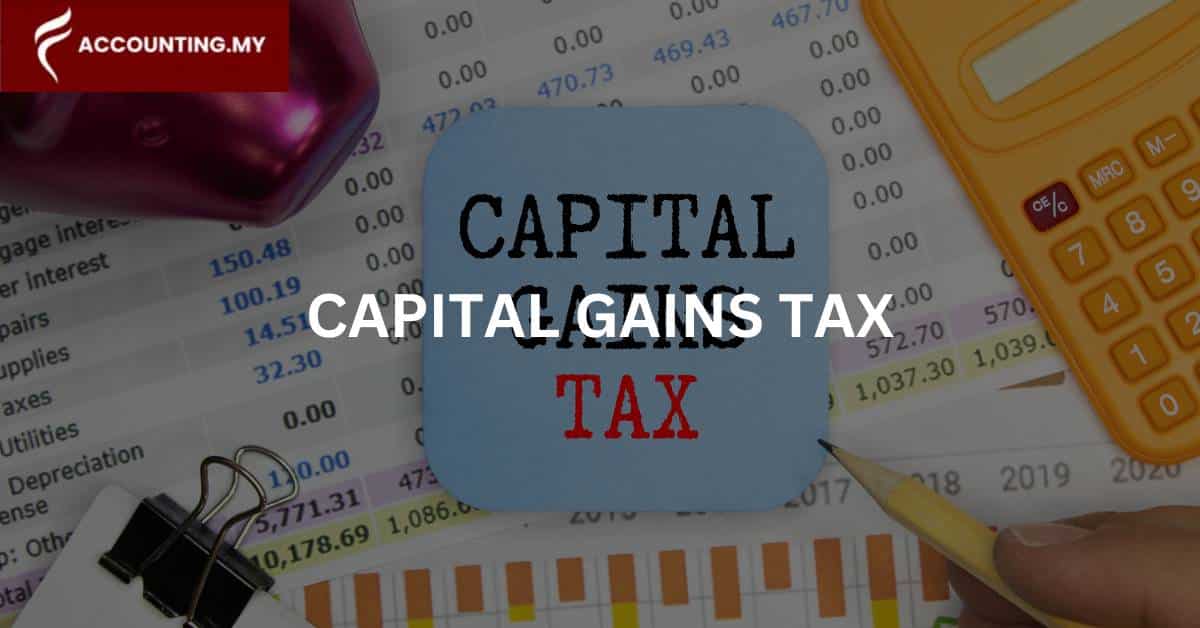Key Takeaways
- Malaysia does not impose a blanket capital gains tax but applies it to property, unlisted shares, and certain foreign assets.
- Real Property Gains Tax (RPGT) rates depend on ownership duration, with 0% from the 6th year onwards for citizens/PRs. Companies and non-citizens: 10% from the 6th year.
- Unlisted shares CGT (from 2024) applies to entities, at 10% on net gain or 2% on gross proceeds (the 2% option is available only if the shares were acquired before 1 Jan 2024).
- Foreign-asset gains may be taxable when remitted to Malaysia for entities; exemptions to 31 Dec 2026 may apply where economic substance is met.
- Tax planning strategies include timing disposals, using exemptions, and seeking expert advice to avoid costly surprises.
Capital gains tax in Malaysia applies selectively to real property, unlisted shares, and certain foreign assets, rather than across all investments.
In 2025, understanding RPGT rates, share disposal rules, and new remittance requirements is crucial for anyone planning to sell, invest, or repatriate profits.
So if you’re selling your condo, exiting a fintech startup, or cashing out UK shares, don’t let the taxman surprise you after the deal is done.
Today, the leading audit firm will explain Malaysia’s capital gains tax, covering property, unlisted shares, and foreign assets, with clear rules, examples, and planning tips.
What Is Capital Gains Tax in Malaysia?
Capital gains tax is the tax you pay on profits from selling an asset for more than you bought it.
In Malaysia, this isn’t a blanket tax like in the US or UK, it applies only in specific situations.
Where It Applies Locally
- Property: Selling a terrace house in Subang Jaya, a condo in Penang, or even vacant land in Johor can trigger Real Property Gains Tax (RPGT).
- Unlisted company shares: If you cash out of a private business, maybe a stake in your friend’s F&B startup, the disposal is now taxable.
- Foreign-sourced assets: Selling a flat in Melbourne or liquidating overseas shares could be taxed when you bring the profits back into Malaysia.
Why It Matters:
With new rules for unlisted shares and stricter treatment of foreign remittances, the tax net is wider than before. Anyone selling, investing, or moving funds internationally should understand these rules to avoid nasty surprises.
How Does Real Property Gains Tax (RPGT) Work in Malaysia?
RPGT is the main form of capital gains tax in Malaysia.
It applies when you sell property (or shares in a property-holding company) for a profit. Think houses, condos, shoplots, land , basically, if you’re flipping property for gain, RPGT is involved.
RPGT Rates in 2025 (Citizens & PR Holders)
Holding Period | Tax Rate | Example |
Within 3 years | 30% | Buy a condo in 2023, sell in 2025 → 30% tax on profit |
4th year | 20% | Buy a landed home in 2021, sell in 2025 → 20% tax |
5th year | 15% | Buy in 2020, sell in 2025 → 15% tax |
6th year onwards | 0% | Buy in 2018, sell in 2025 → No RPGT for citizens/PRs |
Note: Companies and non-citizens usually still pay 10%, even after holding for more than 5 years.
Exemptions You Should Know
- Once-in-a-lifetime exemption: You don’t pay RPGT when selling your private residence (a family home), but you can only use this exemption once.
- Family transfers: Passing property between parents, children, or spouses may qualify for exemptions. For example, transferring a family house from father to daughter doesn’t usually trigger RPGT.
Everyday Examples
- Short-term flip:
Firdaus buys a condo in PJ for RM500,000 in 2023. He sells it in 2025 for RM800,000. Profit = RM300,000.- Tax = 30% of RM300,000 → RM90,000 RPGT.
- Tax = 30% of RM300,000 → RM90,000 RPGT.
- Long-term sale:
Kavanesh bought a double-storey terrace in Shah Alam in 2016 for RM400,000. He sells it in 2025 for RM600,000. Profit = RM200,000.- No RPGT, since he owned it more than 6 years.
Basically, the longer you hold, the less tax you pay.
What About Unlisted Shares Disposal Tax?
Starting 1 January 2024 (with returns/payment from 1 March 2024 for Malaysian-incorporated shares), Malaysia imposes capital gains tax (CGT) on disposals of unlisted shares by entities, such as companies, LLPs, trust bodies and co-ops.
Individuals disposing of unlisted shares held personally are not within CGT’s scope.
How the tax work:
- 10% on net gains (after allowable costs), or
- 2% on gross proceeds, only if the shares were acquired before 1 Jan 2024.
Choose the method that results in the lower tax.
Examples
- An investor in a local café chain: Invested RM200,000 in 2020 and sells for RM600,000 in 2025.
- Net gain RM400,000 of 10% = RM40,000
- 2% of RM600,000 = RM12,000
- choose 2%
- Tech founder exit: Sells 30% for RM2,000,000 in 2025 with minimal base cost .
- 10% = RM200,000
- 2% = RM40,000
- Choose the 2%
- Family manufacturing business: Cost RM5m and sale for RM6m, hence gaining RM1m.
- 10% = RM100,000
- 2% of RM6m = RM120,000
- The 10% is lower, so it will be chosen
Note: If the disposer is an individual holding the unlisted shares personally, CGT does not apply.
Exemptions:
- Certain approved group restructurings, venture capital disposals, and IPO-related disposals can qualify for exemption (conditions and time windows apply).
Read more: E-invoicing Malaysia Guidelines: What You Need To Know
Are Foreign Assets Taxable When Brought Back to Malaysia?
Since the Finance Act 2023, Malaysia has tightened rules around foreign-sourced income. This can include profits from selling assets overseas (property, shares, other investments) when the money is brought into Malaysia.
- Individuals (residents): Remitted foreign income/gains are exempt until 31 December 2026 (conditions/documentation apply).
- Entities (companies/LLPs/trusts/co-ops): Remitted foreign gains are generally taxable at normal income-tax rates, with potential exemptions (until 31 Dec 2026) if economic-substance conditions are met.
In other words, it’s not taxed just because you sold something abroad. Tax only comes into play on remittance, and for individuals, there’s a temporary exemption through 2026 (subject to conditions).
What Counts as a “Foreign Asset”?
- Overseas property: Apartments, houses, or land in countries like Australia, Singapore, or the UK.
- Foreign company shares: Stocks listed outside Malaysia, like Tesla or DBS Bank.
- Investments abroad: Unit trusts, mutual funds, or private businesses registered overseas.
Why Is This Happening?
Malaysia is aligning with OECD BEPS 2.0, a global effort to curb profit shifting to low-tax locations.
“Simply put, the government wants to close loopholes where gains are made abroad but enjoyed in Malaysia tax-free, while giving a transition period to get compliant.”
Examples
Property sale abroad (individual)
Haris bought an apartment in Melbourne for AUD400,000 in 2015. In 2025, he sells it for AUD650,000 (gain AUD250,000).
- If he keeps the money in Australia, no Malaysian tax applies.
- If he transfers the profit back to Malaysia in 2025, it’s generally exempt for individuals until 31 Dec 2026 (subject to conditions).
Shares in foreign companies (individual)
Jia Wen invested USD50,000 in U.S. stocks in 2020. By 2025, her portfolio is worth USD120,000 (gain USD70,000).
- If she cashes out and remits the profit into Malaysia in 2025, it’s generally exempt for individuals until 31 Dec 2026 (subject to conditions).
Family business abroad (entity)
A family holds shares in a Singapore-based logistics company via their company. They sell the stake in 2025 for a significant profit.
- If they reinvest the money in Singapore, no Malaysian tax on remittance.
- If they repatriate the money back into Malaysia, entity rules apply: taxable unless an exemption applies (e.g., economic substance under the 2026 window).
“When you remit foreign profits back into Malaysia, they’re treated under the income tax rules. Individuals currently have an exemption until 31 Dec 2026 (conditions apply); entities may also get relief if they meet economic-substance requirements.”
Comparison: Capital Gains Taxes in Malaysia (2025)
Type | Covers | Rates (2025) |
RPGT | Sale of Malaysian property & (for individuals) shares in property companies (RPC) | Citizens/PRs: 30% (≤3 yrs), 20% (4th yr), 15% (5th yr), 0% (≥6 yrs). Non-citizens/companies: 10% from 6th year |
CGT | Entities (companies/LLPs/trusts/co-ops) selling private company shares | 10% on net gain or 2% on gross proceeds (2% option only if shares were acquired before 1 Jan 2024). Individuals are not subject to this CGT. |
Foreign Sourced Gains | Profits from overseas assets brought into Malaysia | Individuals: Exempt until 31 Dec 2026 (conditions apply). Entities: Taxable at prevailing rates unless they qualify for temporary exemptions (to 2026) with economic substance |
Easy rule of thumb:
- Selling local property = RPGT.
- Selling private company shares = Unlisted Shares CGT for entities (not for individuals).
- Bringing in profits from overseas = Income-tax rules on remittance
Knowing Capital Gains Tax in Malaysia
Malaysia’s capital gains tax framework may look lighter than in many countries, but it has very specific, high-impact applications in property, unlisted shares, and foreign assets.
But tax rules can be confusing, especially when they involve timing, exemptions, or cross-border transactions. Instead of guessing and risking penalties, let the experts help.
At Accounting.my, we specialise in capital gains tax, from calculating (RPGT), to advising on unlisted share disposals, and managing foreign asset remittances.
Whether you’re selling property, exiting a business, or planning to bring overseas profits into Malaysia, we make the process clear, compliant, and efficient.
Get in touch with us today and let us help you save time, reduce risk, and manage your tax with confidence.
Frequently Asked Questions About Capital Gains Tax in Malaysia
RPGT is a tax on profits from selling real property or shares in a property-holding company.
Individuals: No, not under the new CGT on unlisted shares. Entities: Yes, 10% on net gain or 2% on gross.
Yes, when profits from foreign assets are remitted into Malaysia, subject to conditions and exemptions until 2026.
For Malaysian citizens and PRs, it drops to 0% after 6 years of ownership.
Yes, certain transfers between family members are exempt from RPGT.
No, capital gains tax applies only to specific disposals, while income tax covers earnings such as salary or business income.















